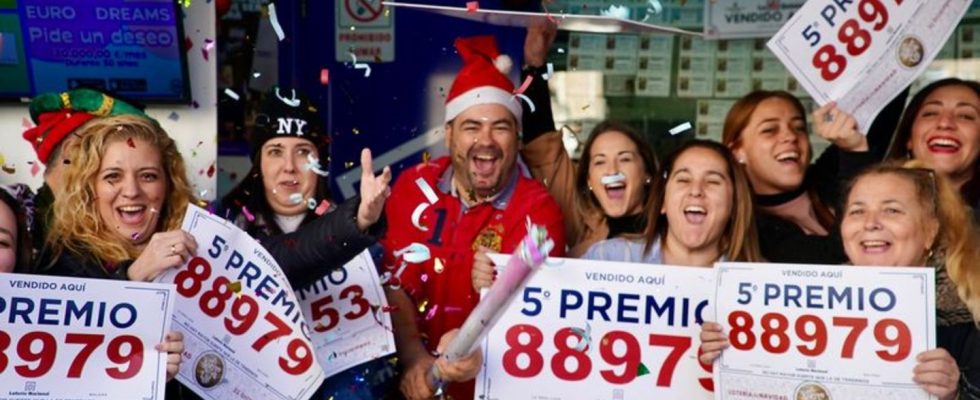Spain
Christmas lottery: long wait for the main prize
Winners of the Christmas lottery prizes celebrate in front of a lottery office in Málaga. photo
© Álex Zea/EUROPA PRESS/dpa
Millions of Spaniards will be put through a particularly long period of torture this year in the famous Spanish Christmas lottery. Only after more than four hours is the lucky number for the main prize “El Gordo” determined.
Millions of Spaniards this year took part in the world-famous Spanish lucky number draw Christmas lottery on Friday not only requires a lot of luck, but also a lot of patience. The main prize, “El Gordo”, the fat one, was only drawn at the very end of the more than four-hour event – as late as never before in the history of the world’s oldest lottery, Spanish media wrote on Friday.
But the wait was worth it, at least for those who bought a ticket with the number 88008 – they are entitled to four million euros minus taxes. Most of the total of 185 tickets with the number of the main prize were sold in the Valencia region on the Mediterranean, especially in the small town of Vilamarxant with just under 10,000 inhabitants.
For a tenth ticket for 20 euros, which most people buy, the lucky winners are entitled to 400,000 euros for the “Gordo”. Before that, however, the tax authorities deduct 20 percent taxes from all profits of 40,000 euros or more. Of the 400,000 euros, 328,000 euros will then be paid out. The main winner is definitely Father State. In total there were tickets worth 3.7 billion euros. Almost 2.6 billion euros in profits will be paid out this year.
Singing for hours
The draw began at 9 a.m. at the Teatro Real opera house in Madrid. As every year on December 22nd, students from the Ildefonso boarding school aged 8 to 14 sang out the ticket numbers and the corresponding winning amounts. It wasn’t until 1:15 p.m. that a little boy announced the main prize in a cracking voice. The tradition of auditioning dates back to the 19th century. In the auditorium, where the most loyal supporters of the Christmas lottery were sitting, cheers broke out, even though none of them had apparently won the main prize.
Dressed up as Santa Claus or other imaginary characters, they watched the children sing for hours, sometimes with bated breath, sometimes applauding when major prizes were awarded. This year there was even a “pope” there, a perfectly dressed man with his shy son. The two challenged their luck with two very special ticket numbers: 00000 and 99999, the lowest and the highest.
But in addition to the hope of a big windfall, the Christmas lottery in Spain is, above all, great fun. TV stations reported live from lottery ticket offices where winning tickets had been sold. Owners and sellers are almost as happy as if they had won themselves, champagne flows freely. And that also applies to millions of players who came away empty-handed. “Being there is everything,” two women who had printed their tickets on large sheets of paper and wore them like aprons in front of their stomachs told the TV station RTVE in Madrid.
Millions of people in front of their screens
Millions of people across the country sat in front of their screens so as not to miss a moment of the live broadcast lasting several hours. The lottery, which was founded more than 200 years ago, is characterized by many prizes that are not as dizzyingly large as some other lotteries.
Traditionally, families, work colleagues or groups of friends buy one or more entire tickets together, which cost at least 200 euros each. The joint decision on which number to bet on, the shared hope for great luck and the collective trembling while the winning numbers are drawn is what makes the Christmas lottery so special for many people. Even a failure is easier to get over in a group.
The drawing of the winning numbers always follows a strict ritual. A large grid ball contains 100,000 small wooden balls with five-digit winning numbers and a smaller grid ball contains 1,807 balls with the prize money printed on them. At the same time, a ball falls from each of the two grid balls into a bowl: the winning number and the corresponding prize. Each individual ball is sung by the children and then registered and secured.

